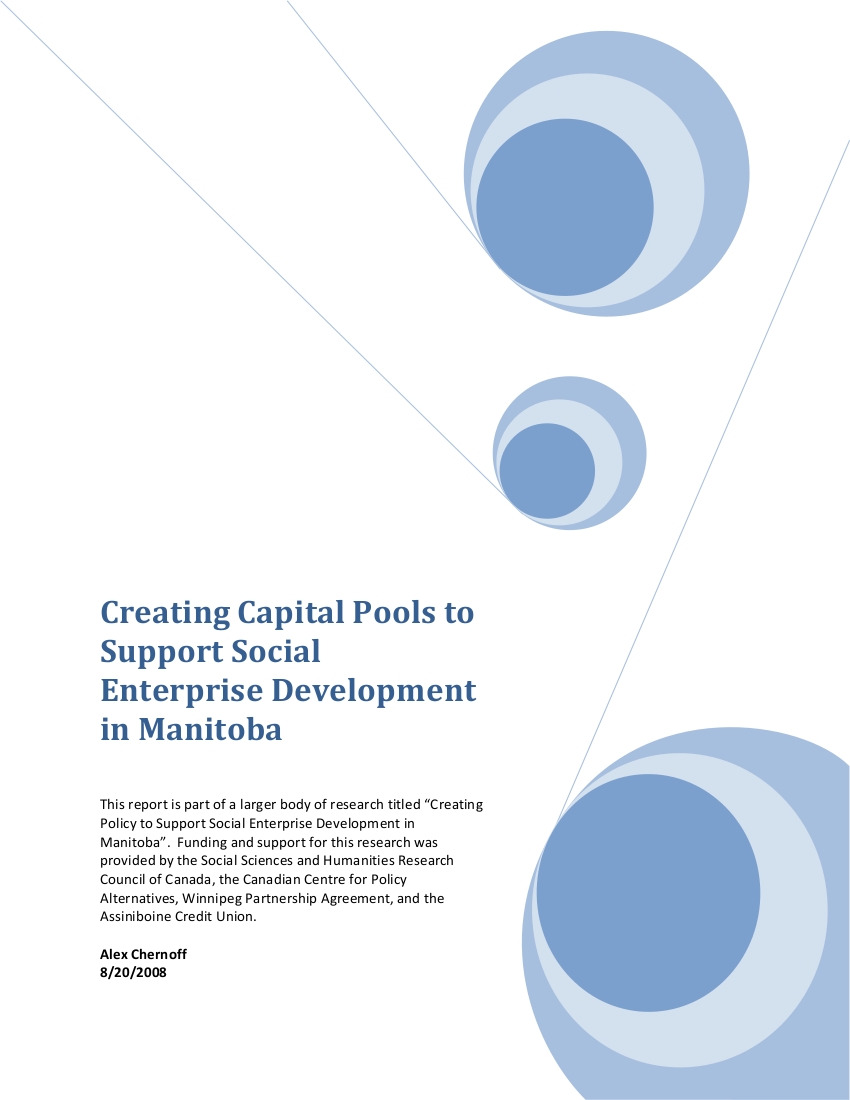This research project is part of a larger body of research being completed under the title of Creating Policy to Support Social Enterprise Development in Manitoba. The thesis of the larger research project is stated as follows in the project’s scope of work:
The thesis of the research is that other jurisdictions have created large scale, viable social enterprises that meet CED principles, whereas Winnipeg has tended to create small, grant dependent social enterprises while following the same principles. The research will test this thesis, examine the factors that have led to success elsewhere, and draw conclusions about how to replicate the success of other jurisdictions in Winnipeg.
As a contribution to the larger body of research, this project will examine social enterprise funds/trusts, and tax credit programs that are relevant to financing social enterprise. This will be accomplished by examining the following six social enterprise funds/trusts:
- Northcountry Cooperative Development Fund
- The Chantier de l’économie sociale Trust
- ICOF Community Capital Limited
- Ontario Social Enterprise Trust
- Toronto Social Enterprise Fund
- Edmonton Social Enterprise Fund
In addition, this report will examine the following two tax credit programs:
- Nova Scotia Equity Tax Credit and Community Economic Development Investment Funds (CEDIFs)
- Manitoba CED Tax Credit Program
When reviewing the Nova Scotia CEDIFs, information will be provided on how the CEDIFs are operating (in certain circumstances) as capital investment funds in support of social enterprises.
A third aspect of this report will be to revisit the 2004 Manitoba Social Enterprise Investment Fund (SEIF) Business Plan. The objectives of this section of the report are two-fold:
- To provide a brief overview of the different aspects of the proposed SEIF. This overview will be based on the July 2004 SEIF Business Plan and contextual information1 concerning the current realities of the proposed activities and structure of the fund.
- To provide a comparative analysis with the seven social enterprise trusts/funds reviewed in this report (inclusive of the six funds/trusts listed above plus the Nova Scotia CEDIFs). The focus of this comparison will be on establishing which of the funds are most similar to the proposed SEIF and which are most different.
In the final section of the report 3 categories of conclusions will be developed:
- Conclusions concerning social enterprise funds/trusts and the proposed Manitoba SEIF;
- Conclusions concerning the Manitoba CED Tax Credit;
- General characteristics table developed by the research team.
The first two categories of conclusions will be developed with the objectives of summarizing the key findings of the report and suggesting the next steps that are required for further development of the proposed Manitoba SEIF. In addition to those conclusions specific to the ongoing development of the Manitoba SEIF, a three-step process is presented as a strategy for developing successful social enterprise funds.
The general characteristics table provides a summary that was developed by the research team specific to those funds reviewed in the report that are most relevant to the Manitoba context.
Downlowd the PDF
Table of Contents
I. Introduction
II. Established and Developing Social Enterprise Funds
- Northcountry Cooperative Development Fund
- The Chantier de l’économie sociale Trust
- ICOF Community Capital Limited
- Ontario Social Enterprise Trust
- Toronto Social Enterprise Fund
- Edmonton Social Enterprise Fund
III. Tax Credit Programs Relevant to Financing Social Enterprise
- Nova Scotia Community Economic Development Investment Funds
- Manitoba CED Tax Credit Program
IV. Revisiting the Proposed Manitoba Social Enterprise Investment Fund
V. Conclusions
VI. Appendix 1: Social Enterprise Continuum
VII. Appendix 2: Ineligible business activities of Manitoba CED Tax Credit program
Source : Community Wealth





